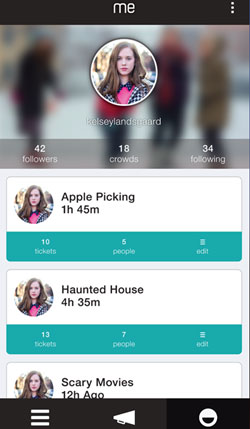A group of students at the Maryland Institute College of Art (MICA) tried organizing a snowball fight this week with whatever remnants of snow were left after Tuesday’s paltry precipitation, but they didn’t text one another or get in touch through Facebook.
Instead they used a free iPhone app called Crowds, which takes the event creation aspect of Facebook and the followers feed of Twitter and mashes them together. Created by MICA sophomores Jordan Bradley and Zak Crapo, the app launched last Friday. As of Wednesday, 226 people had signed up as users on the app.
“Crowds is almost intentionally anti-Facebook Event in a lot of things built into it,” said Bradley, a 19-year-old interactive design major. (While Bradley saw someone post the snowball fight on Crowds, he isn’t sure whether the app was the reason behind the snowball fight happening.)
Download Crowds for iOS here.
It even looks like a Twitter feed. Users on the app have followers — as Twitter users have — and all followers can start or join Crowds. Unlike Facebook Events, where people are invited, events on Crowds are open for any of a particular user’s followers to join. The main stipulation, however, is that any event created on Crowds can’t be planned any further in advance than the next day, or any sooner than 15 minutes from the current time. Trying to round up a group of friends to see a show at the Windup Space in five hours? Use Crowds.
“The key thing is spontaneity,” Bradley said. “I’m sitting in class. I see no one’s occupying the quad — why not have a soccer game?”
So far, he said, Crowds users have created such events as “Snow Ball Fight,” “Architecture Quiz Group” and “Bolton Deli with Me and Nate.” Users select a free ticket to indicate their intention to attend a “Crowd.”
A “popularity algorithm” — tracking how many people have joined a certain user’s events versus how long that user’s Crowds account has been active — shows which users are worth following on Crowds. And by ditching the invitation system people are used to when setting up a Facebook Event, Bradley hopes Crowds will help facilitate connections among MICA’s 1,863 undergraduates, both the shy freshmen and the seasoned upperclassmen.
That’s because, as Bradley thinks, Facebook is becoming less popular among his fellow classmates, especially when it comes to planning events.
“I think tech has gotten to the point where it’s not about solving a core problem in an existing framework, but about making an experience better,” he said.
He might be on to something, as some new data bears out that Twitter is more popular among the 18-to-24 set and that Facebook users don’t turn to the social network to create and join events.
Still, it’s early, and taking on the two giants of social media — even if it’s only on one campus in one city in one state for now — comes across as a touch foolhardy.
But Bradley and Crapo, a 19-year-old graphic design major, remain undeterred.
“It doesn’t carry the sort of stigma that a Facebook event has,” Bradley said. “With Crowds … you’re opening the door to people that you might not have invited [on Facebook].”
Join the conversation!
Find news, events, jobs and people who share your interests on Technical.ly's open community Slack

Baltimore daily roundup: Gen AI's software dev skills; UpSurge Tech Ecosystem Report; MD service year program

Baltimore daily roundup: Mayoral candidates talk tech and biz; a guide to greentech vocabulary; a Dutch delegation's visit

Baltimore daily roundup: An HBCU innovation champion's journey; Sen. Sanders visits Morgan State; Humane Ai review debate



